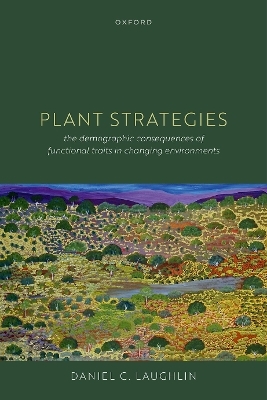
Plant Strategies
Oxford University Press (Verlag)
978-0-19-286794-0 (ISBN)
How do plants make a living? Some plants are gamblers, others are swindlers. Some plants are habitual spenders while others are strugglers and miserly savers. Plants have evolved a spectacular array of solutions to the existential problems of survival and reproduction in a world where resources are scarce, disturbances can be deadly, and competition is cut-throat. Few topics have both captured the imagination and furrowed the brows of plant ecologists, yet no topic is more important for understanding the assembly of plant communities, predicting plant responses to global change, and enhancing the restoration of our rapidly degrading biosphere. The vast array of plant strategy models that characterize the discipline now require synthesis. These models tend to emphasize either life history strategies based on demography, or functional strategies based on ecophysiology. Indeed, this disciplinary divide between demography and physiology runs deep and continues to this today.
The goal of this accessible book is to articulate a coherent framework that unifies life history theory with comparative functional ecology to advance prediction in plant ecology. Armed with a deeper understanding of the dimensionality of life history and functional traits, we are now equipped to quantitively link phenotypes to population growth rates across gradients of resource availability and disturbance regimes. Predicting how species respond to global change is perhaps the most important challenge of our time. A robust framework for plant strategy theory will advance this research agenda by testing the generality of traits for predicting population dynamics.
Daniel C. Laughlin is Associate Professor, Department of Botany, University of Wyoming, USA. His laboratory develops quantitative approaches to understand and predict how plant species and communities respond to global change. He currently teaches courses in ecological modelling and vegetation ecology, and is Associate Editor of Ecology & Ecological Monographs.
Prologue
Part 1: Foundations
1: Perspectives on Plant Strategies
2: A Menagerie of Plant Strategy Models
3: The Dimensionality of Plant Strategy Theory
Part 2: Demography and Life History
4: Plant Demography
5: Life History Theory Applied to Plants
Part 3: Comparative Functional Ecology
6: Plant Functional Traits and the Multidimensional Phenotype
7: Plant Strategies Along Resource, Disturbance, and Temperature Gradients
Part 4: The Net Effect of Traits on Fitness
8: Empirical Approaches to Infer Fitness from Traits
9: Game Theoretical Approaches to Infer Fitness from Traits
10: Applying Plant Strategies in Conservation and Restoration
Part 5: The Effect of Traits on Demographic Rates
11: Plant Traits That Promote Growth and Enhance Survival
12: Plant Traits That Bolster Recruitment
Epilogue
| Erscheinungsdatum | 29.07.2023 |
|---|---|
| Verlagsort | Oxford |
| Sprache | englisch |
| Maße | 175 x 253 mm |
| Gewicht | 1034 g |
| Themenwelt | Naturwissenschaften ► Biologie ► Botanik |
| Naturwissenschaften ► Biologie ► Ökologie / Naturschutz | |
| ISBN-10 | 0-19-286794-6 / 0192867946 |
| ISBN-13 | 978-0-19-286794-0 / 9780192867940 |
| Zustand | Neuware |
| Haben Sie eine Frage zum Produkt? |
aus dem Bereich


